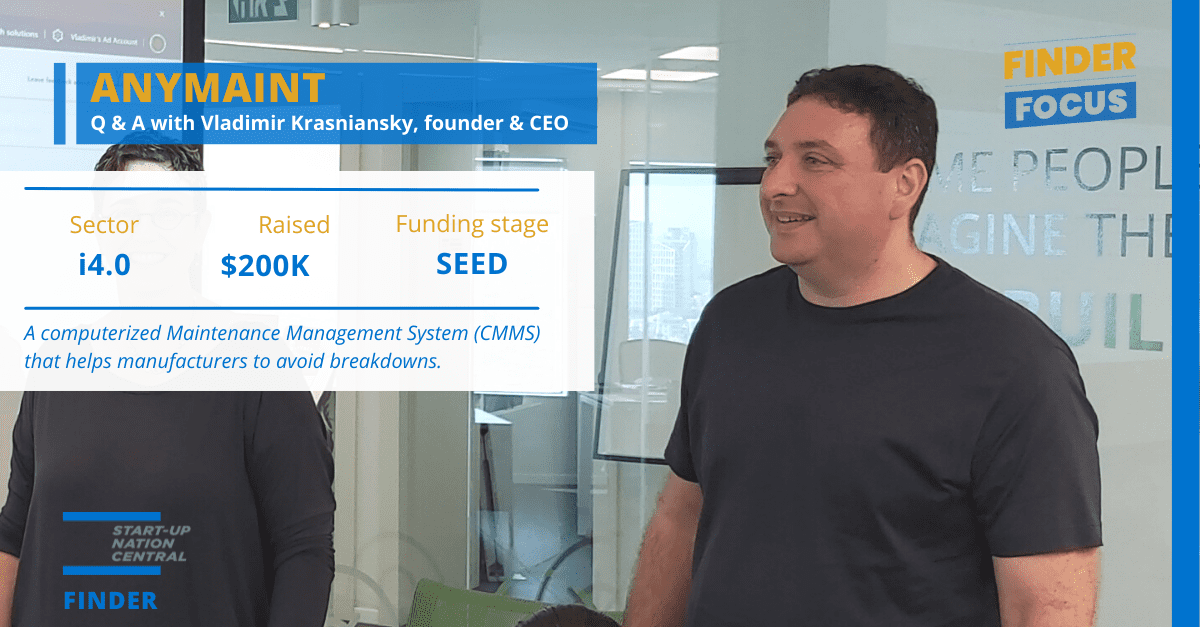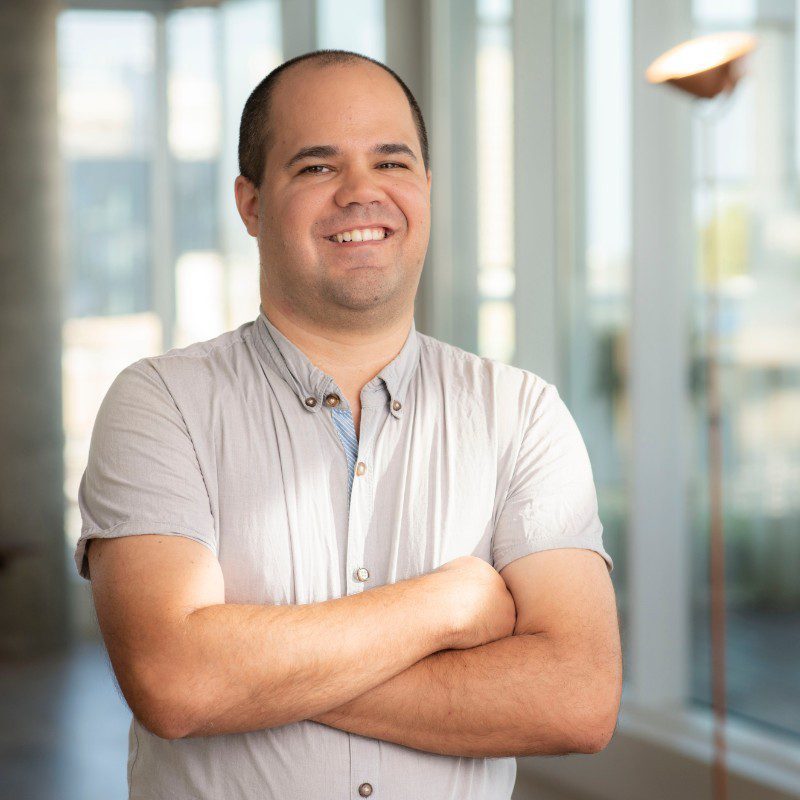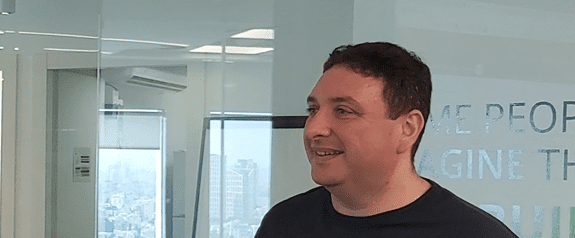AnyMaint is a preventative maintenance platform rooted in simplicity.

“The most technical people in the world are ‘technophobic’ when it comes to maintenance work documentation.”
Vladimir Krasniansky
Vladimir Krasniansky is the founder of AnyMaint, the creators of a CMMS (Collaborative Maintenance Management System) that manages, monitors, and analyzes maintenance data in order to give manufacturers “the big picture” about their processes and enable them to be proactive in servicing machines in order to avoid breakdowns. While some may say that the preventative maintenance market is saturated with solutions, Vladimir explains why the sea of opportunity is still vast. In this Q&A interview, he explains why he does what he does, the obstacles he faces, and his key to success: simplicity.
Maor: What do you do?
AnyMaint is a platform for maintenance management. It sounds very simple, most people don’t even feel it – we just use machinery and we see the machinery’s results. Machines bring us water, electricity, food, and so many other things. People talk about “cloud solutions” but they’re not clouds – they’re machines; they’re computer servers sitting in big rooms that need to be built and maintained. The fact is that we’re completely surrounded by machinery. Luckily, this machinery works well about 95% of the time. But what happens when 95% gets reduced to 94%? We begin to see problems. Things get more expensive. Oil prices go up. Transportation stops. Many problems like this can happen if a production line loses even just one shift due to a broken machine. That’s the big story about maintenance – in cities, in factories, in hospitals, in agriculture, in any large area of human activity.
So what’s the role of a maintenance software platform? It allows us to track and prevent failures. Historically, failures occur all the time, in factories of all sizes, in semiconductors, in both simple and sophisticated systems – everywhere. The good news is that we can now prevent those failures. How? With Industry 4.0. Use data. Use sensors. Connect them. Understand them. Enable the engineers to learn and act to prevent failures with preventive maintenance.
MAOR: What problem did you see in the world that inspired you to create your solution?
There are lots of problems – for example, you fix something and no one records what happened or how it was fixed. That means the next time it breaks, the repair people and engineers have to start the entire process again from zero. It’s a huge waste of time and money. Also, many factories have things that break periodically – planning to fix recurring breakdowns is not predictive maintenance. What has to happen is, for example, a weekly adjustment so they don’t break down at all. That’s preventive maintenance.
“There’s a lot of software engineers that cannot fix their own washing machine at home.”
I started as a process engineer and then worked in many roles in factories: in operations, production, and maintenance. In those roles, I had many activities to execute, and in order to prioritize these activities, I needed very simple and efficient tools. But I couldn’t find this simplicity. So when I decided to become a software entrepreneur, this was the first problem I wanted to focus on and build a software platform to fix. So we built our software while learning directly from customers on ways to do it better and better, to make our solution the simplest one, to provide predictive maintenance in real-time. Our product is very simple and very visual. Anyone can use it easily. It’s all about simplicity.
MAOR: Let’s talk about the obstacles you’re facing. For example, isn’t the predictive maintenance area already saturated with solutions?
It’s true that we hear about predictive maintenance a lot these days and some people may say that the sector is saturated. But as it turns out, most factories are not using this type of software at all. Of course, it’s no surprise that small and medium factories are slower to implement these kinds of solutions, but I can tell you that big multinational corporate manufacturers are also very slow to adapt. They’re just not using it. Why? There are a lot of reasons…
“Maintenance is not a profit center – it’s a cost center and top management doesn’t like investing in cost centers.”
For example, the most technical people in the world are “technophobic” when it comes to maintenance work documentation. They love to work on the most complicated machinery in the world, but they don’t like computers and software tools. Furthermore, the organizations themselves don’t like these types of solutions. They don’t understand them and so they don’t invest enough money to improve their situations. This happens despite an abundance of case studies, proofs of ROIs, and things like this. It sounds illogical and it absolutely makes no sense but here’s a few possible explanations: if you like computers, you work with computers. If you’re good with a wrench, you work with a wrench. There are a lot of software engineers that cannot fix their own washing machine at home – an engineer who can’t fix his or her own washing machine? What’s happening here?
And of course, there are deeper things: the organization’s culture and what’s being measured. Maintenance is not a profit center – it’s a cost center and top management doesn’t like investing in cost centers. It’s very hard to break past these barriers.
MAOR: So what’s the answer?
The answer – our answer– is to be simple, be effective, and fit the audience and situations that we’re working with. We don’t provide a complicated solution that only works in a nice air-conditioned office. Our solution is simple and works in the field. Because people use Whatsapp, we’ve integrated our solution with Whatsapp. You send a message to say whether the failure is resolved and that’s it. It’s not sophisticated but it works great. It’s something people in the factory use. So again, simplicity is key.
MAOR: What are you most proud of?
Our customers. They’re our greatest pride. For example, one of our customers is Arkia, the Israeli aviation company. So if you fly with them, you’re also flying with AnyMaint. I don’t think I have to explain, but obviously, you don’t want to have maintenance problems during your flight.
We’re proud of making factories more profitable, especially during Covid. For example, you look at a factory in China and you say, how can we possibly compete? But after that first scare, once you examine things closely, you say: “OK, let’s see how we can do it.” You start looking at automating processes, improving efficiencies and effectiveness – and sometimes it works.
MAOR: What does success look like to you?
I want AnyMaint to become the industry standard. Absolutely. We also want to enter new areas, in all kinds of production flows, to make processes work together like an orchestra. This is our passion: to make production flow better.
MAOR: What do you need to get there?
The usual: investors, partners, nothing special here. Great products are built by great teams. We’re only in Israel right now so we’ll be looking to expand globally.
MAOR: What would you like the world to know about Israel?
We are here because our parents and grandparents did impossible things in an impossible place. This is in our DNA. We know when something looks crazy and impossible, but then we do it anyway. We can make the best rockets in the world but we can also make the best medicines in the world. We’re good at this.
MAOR: And now how about some advice for international visitors to Israel? Things to do? Fun activities?
Go north or south. Don’t get stuck in Tel Aviv – never! An hour south is fantastic, it’s like the movie Dune. And an hour north is more fantastic with fascinating places to visit.
Click here to learn more about AnyMaint on Start-Up Nation Finder, your innovation business platform. Finder enables you to gain insights about industries and connect to companies, investors, and multinational corporations, functioning as an engagement space for identifying and growing business opportunities.
SUMMARY: AnyMaint
- CHALLENGE: Downtime in factories due to broken machines.
- PRODUCT: Predictive maintenance software platform
- BENEFITS: Increased efficiency by eliminating machine downtime.
- MAIN FEATURES: Data accumulation, failure records, machine learning, reports, insights, troubleshooting recommendations.
- USE CASES: B2B. Predictive maintenance for Arkia Israeli Airlines Ltd.
- SEEKING: Investors & partners to expand globally.

Maor Perlov is an Information Specialist at Start-Up Nation Central.
